- Home
- Patrick E. Andrews
Indian Territory 3 Page 2
Indian Territory 3 Read online
Page 2
Martin sat at Grover’s own desk to write up the story. He did it rapidly and had just finished the job when the boss himself came sauntering back from dinner.
“There was a shooting while you were gone, sir,” Martin explained, sheepishly jumping up from the chiefs chair. “I ran down to the jail and interrogated Mr. Earp about the details. I’ve jotted them down for you.”
Grover was uncommonly pleased. “That was mighty fast thinking there, Martin. I’ll write up a story and we can get it into Friday’s edition.” He sat down in the chair and glanced critically over the writing. Grover sighed and handed the paper back to Martin.
Martin’s face reddened. “I guess I didn’t do too good, Mr. Grover. But I tried.”
“Boy, there’s nothing wrong with this story. It’s short and concise. You’ve covered when, who, where, and how like any good newspaperman. Take it over to the composing room and set it.”
Martin was astounded. “Like it is?”
“Like it is!”
From that point on, Martin’s horizons filled out to include more than just the mechanical work of producing the newspaper. He received reporting assignments, covering crime, local sporting events, the social whirl, and other happenings in Wichita.
Five years after his beginning as a printer’s devil, Martin Blazer was a fully qualified, working professional journalist and journeyman printer. He had received some increases in his wages, so was able to move into one of the city’s better boardinghouses and even own a couple of store-bought suits. From all appearances, Martin had truly found his niche in life, yet there was still something missing that gave him occasional edgy feelings of discontent and restlessness. He never could quite figure out what was lacking when his work was so fully self-satisfying, until Mr. Grover decided to make some changes in the paper in the guise of new equipment.
A replacement press and newly cast type from an eastern foundry were shipped out from Philadelphia. When the equipment arrived, the old stuff had to be disposed of to make room for it. Martin felt a sentimental twinge about parting with things that had been so important in his life. He decided to pay them a last visit out on the loading dock in the alley behind the newspaper office. When Martin saw the press and the fonts of type packed up to be taken away, his mind suddenly lit up with a fantastic idea. He went back inside and boldly approached his employer.
Grover, his customary eyeshade on, was going over his advertising accounts. He looked up as Martin approached. He could tell by looking at the young man that something mighty important was on his mind.
“Mr. Grover.”
“Yeah, Martin?” Grover eyed his reporter-printer closely, waiting to see what he had to say.
“Sir, I’m giving my notice.”
Grover shrugged. He was surprised that Martin had stayed that long. Most of the newspaper breed were a wandering clan anyway. “You can leave anytime that pleases you, Martin.”
“Thank you, sir. And I would be pleased to purchase the old press and the type out back.”
“How can you afford that, young man?” Grover asked.
“I came to Wichita with some money from a farm sale,” Martin explained. “It’s been in the bank drawing interest for more than five years. And I’ve saved a bit out of my wages.”
“Damn! If you were able to do that, I was paying you too much.”
“At any rate,” Martin said, “I would like to make you an offer for the old equipment.”
Now Grover’s eyes widened. “Are you thinking of starting your own publication, Martin?”
“Yes, sir. I am.”
“God damn it! Are you going into competition with me?”
“Oh, no, sir! I have the idea of returning to my hometown in the Indian Territory to publish.” Grover laughed. “Are you crazy? Who the hell is going to be your reading public among a bunch of wigwams?”
“Sir, the Indian Territory is the home of the Five Civilized Tribes,” Martin said. “I am proud to tell you that I am part Cherokee.”
“I am not casting aspersions on your family, Martin,” Grover said.
“Besides the Cherokee, there are the Choctaw, the Creek-”
“I know, Martin.”
“—the Seminole—”
“I know, Martin!”
“—and the Chickasaw,” Martin continued doggedly. “They are an educated people who can read and write the English language. There are schools, towns, and other vestiges of civilization.”
“I will sell you the equipment,” Grover said. “Please spare me a dissertation on your homeland.”
“Thank you, Mr. Grover. I think you will be proud to have even a small thing to do with the establishment of the Lighthorse Creek Sentinel.”
“Ah! You already have the name, have you?”
“Yes, sir,” Martin said. “The whole scheme of the affair occurred to me out on the loading dock. I shall call my newspaper the Sentinel, because it will be a guardian of the truth.”
“Most noble, young Mr. Blazer.”
“Thank you, sir.”
“And I will make you a good price,” Grover said. “You have served me well and demonstrated considerable aptitude and intelligence. I must admit that I feel no less about you than a proud father does of a dutiful son.”
“Thank you, Mr. Grover,” Martin said with a wide smile. He paused, and narrowed his eyes. “How much do you want for that stuff?”
~*~
The wagon rolled agonizingly slowly for Martin Blazer’s youthful enthusiasm. Every once in a while he would turn and cast a proud glance back at the type and that big press lashed down in the vehicle.
Martin’s return to his hometown was not totally unexpected. A family friend, J. T. Buchanan, ran the general store in Lighthorse Creek. He had been good friends with the Blazer family over a period of years. When Martin left home to strike out on his own he had been forced to travel light. So the young wanderer had entrusted his books to the Buchanan family. Buchanan was a widower, but he had a gawky thirteen-year-old daughter. J. T. Buchanan had promised to guard these treasures until Martin sent for them.
But instead of writing to retrieve his belongings, Martin sent a letter announcing his return home. He also told of his plans to open a newspaper and printing office in the town, and requested J. T. to find a suitable place for him. Then, without waiting for a reply, he had purchased a mule team, wagon, and the equipment, and begun his journey.
Now Martin reached a well-worn track. There was a crude sign beside it that bore a painted arrow and the lettering:
LIGHTHORSE CREEK 5 MILES
Martin grinned happily and urged the animals on. He had rolled along for another hour when he noticed a pair of horses off to one side of the trail. They were tethered to a tree, idly nibbling at the fresh, green grass beneath it. A pair of men, obviously waiting for passing travelers, stood nearby.
Martin could tell they were armed, but he felt no alarm. Trail robbers would hardly advertise their presence so boldly. He approached them steadily, finally drawing up alongside. He pulled back on the reins. “Whoa!”
The men were hard-eyed whites, with several days’ growth of beard under the large mustaches they sported. The taller, a carbine over his shoulder, sauntered up. “Howdy.”
Martin, feeling a little nervous, nodded. “Hello.”
“You toting liquor or other goods into Lighthorse Creek?”
Confused, Martin shook his head. “No. I’m carrying printing equipment.”
One of the men walked around the wagon and peered into the back. “He’s right, Tad. They ain’t nothing in there but machinery. What kind o’ mechanical stuff did you say this is?”
“It’s printing equipment,” Martin answered. “Hell, there ain’t no tax on that.”
“Tax?” Martin asked.
“City tax,” the tall man said. “Tobaccy, whiskey, and other goods. But nothing on mechanical stuff that I know of.”
“When did all this come about?” Martin asked.
“A while back,” the man replied. From the expression on his face it was obvious he would say no more.
“Well, in that case I’ll be on my way,” Martin said.
The two men said nothing. They only stood looking at him, giving every indication that they had no interest in further delay of his journey.
Martin whistled at the mules and resumed his journey with every intention of asking J. T. Buchanan about the strange new town ordinances that had sprung up in his absence.
Three
Tom Deacon glanced out the marshal’s office window to the street of Sondra, Texas. Then he quickly turned his attention back to shoving the .45 caliber shells into the chamber of his Colt. The next few moments of his life were going to depend on those bullets, so he made no safety provision by leaving an empty chamber to lower the hammer onto.
The Colt carried a load of six, as did the Remington in his belt. When the trouble started, it would be fast and explosive with the outcome decided in only a few seconds. There was no reason to have more than twelve rounds in his arsenal.
Tom checked his leather and shook the Colt in the holster to loosen it up. He did the same to the Remington, sliding it up and down in the belt to make sure there was nothing on which it could snag. The last item to check was his hat. He pulled it down snug and tipped the brim forward just a bit, as was his usual style.
Then he walked to the door and paused for another look.
Tom Deacon was a tall man, with sharp, angular features and a well-tended mustachio. Blue-eyed and sandy-haired, women considered him handsome, though in a rough way, and his lean, muscular body sent a silent message to men of its strength and suppleness. He moved with the grace of a mustang at rest, ready for quick, near instinctive action when the need arose.
Tom stepped out onto the boardwalk that ran the entire distance of the one-sided business district of the town of Sondra. There was no other side to the street, only open country that stretched outward into the blurry horizon marking the land where the Kiowas and Comanches still hunted the dwindling herds of buffalo.
Tom turned purposely and boldly toward the north end of the commercial area. He walked deliberately, with measured steps, his eyes nailed on the three men who stood insolently adjacent to the last building of the town.
There was no sound. Not from the birds and other wild creatures living on the nearby prairie. Even the townspeople were mute as they watched the expected drama play out in front of their eyes that stared from store windows or places of safety between the buildings.
Tom Deacon took no notice of them. They were only blurry images in the corner of his eyes, their appearances distorted by panes of glass and broken up by the window frames. He was now thirty yards from the three men. He could see they were armed. Each carried pistols to complement the two repeating Henrys and one Winchester that made up their long-gun arsenal.
“Hey, you, Tom Deacon!” one called out.
Tom didn’t answer. He continued to slowly move forward while he lazily reached up and tipped his hat back.
“You going shopping, Tom?” a second asked him. “Is that why you’re a-sauntering down the street?” He and his pards cackled at the humor.
The third wanted real information. “Have you decided to foller our advice and get the hell outta Sondra?”
Tom didn’t answer. He just continued moving forward in that slow but purposeful gait.
The first man grinned. “Maybe I’ll just shoot you, Tom Deacon.” He held the Henry rifle in front of him. “Is that what you want?”
His pals laughed aloud. “If you want ol’ Dorey to shoot you, just ask him,” one said. “They ain’t no reason to go to all this here trouble, Tom Deacon. Hell, Dorey’ll be proud to blow a hole in your carcass.”
Tom reached the final store. A rain barrel stood under a crude drainpipe on his side of the frame building. When he reached it, he paused an instant.
Then Tom kicked the rain barrel away and grabbed the shotgun stashed behind it. As he swung the barrels up, he went down into a kneeling position. The first barrel belched flame and smoke.
The man named Dorey flipped over on his back as his rifle spun off to land behind him.
Tom swung the shotgun toward the second man and kicked loose another load. The heavy shot sliced into the man’s thighs and lower belly, blowing his legs out from under him and causing him to fall face-first to the dirt street.
Two bullets from the third man split the air around Tom’s head, and he responded by drawing the Remington and firing three rapid shots.
They all missed as the human target backpedaled in an instinctive effort to avoid the slugs. But he kept firing at Tom.
Tom went into a prone position, using the overturned rain barrel as cover. He cut loose with the final three bullets in the Remington, then brought the Colt into play.
The third gunman was now on the ground too. He held the rifle in a steady, well-supported position, drawing a bead on Tom.
Tom fired frantically with the Colt, knowing that the last trump cards were played in the deadly game.
His adversary’s buttocks rose up, then flattened out as the man rolled over on his side. Tom could see the fellow’s face was blown in on one side.
All the action had taken place in six seconds, and now the sudden silence after the instantaneous explosive roar of the gunfight seemed thunderous in its emptiness.
Tom got slowly to his feet and reholstered his pistols. After retrieving the shotgun, he turned and walked back down toward the marshal’s office.
Now the townspeople stepped out of the safety of the stores. Most gazed at Tom Deacon in a mixture of awe and fear. But a few of the wags called out to him.
“That’s the way to do it, Marshal!”
“Good shooting.”
“Dorey and his bunch won’t bother nobody no more thanks to you, Marshal Deacon.”
Tom ignored the remarks. He walked with the same deliberation away from the scene of the fight as he had when going into it. But he stopped in front of the land office that stood in the middle of the row of buildings.
The property dealer, who was also the town mayor, stood by the red-and-white sign that sat by the door of his business. He nodded to Tom. “You handled it good, Tom.”
Tom reached up to his vest and pulled off the star pinned there. He tossed it down to the mayor’s feet. Then he turned and headed back toward the marshal’s office.
“Tom!” the mayor called after him. He picked up the star and followed the lawman. “Tom! I want to talk to you.”
“There ain’t nothing to talk about,” Tom said. The mayor caught up with him. “Maybe nobody backed you up, I’ll admit. But you didn’t expect ’em to, did you?”
“Yeah.”
“Oh, hell, Tom! It ain’t like Dorey and his pals was raiding their farms,” the mayor protested. “These folks don’t understand justice like you and me. They’ll fight like hell to pertect their property, but they won’t get into no gunfights on the street.”
“It was only a matter of time before Dorey made his move against the farms,” Tom countered. “That battle could’ve been fought on the street or in a barnyard. You know that.”
“Sure I do, Tom,” the mayor said. “But some things ain’t so apparent to other folks.”
Tom looked over at his companion. “You didn’t back me up neither, Fred.”
“I can’t shoot good,” Fred said. He pulled the heavy spectacles from his coat pocket. “Hell, I even got to wear these to fill out the land deeds for my customers.”
“I’m gone, Fred,” Tom said.
“Oh, Tom!” Fred said, affecting a laugh. “You’re a lawman. It was your job to go out there.” He suddenly became angry. “That’s what we pay you for! A town marshal has got to take chances.”
“That’s right,” Tom agreed. “Except it finally dawned on me that I really wasn’t hired as a local lawman. I was put on the town payroll as a gunman to handle a situation for only one segment of the town.”
“You didn’t give a damn about justice here,” Tom said. “You and a couple of them other businessmen just wanted them three took out of the way because they was cramping your style. You didn’t give a damn about the farmers.”
“What the hell differ’nce does that make?” the mayor hollered.
Tom’s voice was low and cold. “Because, you son of a bitch, you were going to turn me loose on your other problem people too, wasn’t you?”
“You’re a — ” The mayor wisely shut up.
Tom grabbed him by the front of the shirt and violently shook the man. “You’d have wanted me to shoot a farmer or two, wouldn’t you, Fred? Maybe have me gun down some sodbuster that didn’t want to cave in to your greed for land.”
“Lemme go!”
“I ain’t a bully and I ain’t a hired pistolero.”
“We’ll give you a bonus,” the mayor said desperately.
“You’ll give me the pay due me,” Tom said. “Now!” He pushed the mayor away from him.
The mayor stumbled backward. He sighed. “All right, Tom Deacon. Let’s get down to the town hall.” He turned and walked back up the street with the ex-marshal following him. “But you’re missing a chance to make a hell of a lot of money.”
“I’m a real strange hombre,” Tom said to the man’s back. “But I think there’s a thing or two in this world that can’t have a price put on ’em.”
Four
Martin Blazer pulled hard on the right set of reins and held tightly until the mules had turned onto Lighthorse Creek’s main street. Then he let loose and reached back to rub at the cramp between his bony shoulder blades that the hard physical effort had caused.
The young man glanced up now for the first full view of his old hometown’s commercial area.
“Whoa, mules!”
For several incredulous seconds he sat on the seat, then slowly rose to a standing position. He had expected some change in the appearance of the town, but nothing like the sight that greeted him in the glaring realism of the high noon sunlight.

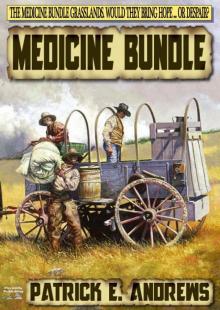 Medicine Bundle
Medicine Bundle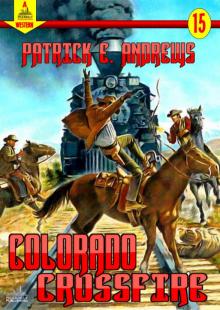 Colorado Crossfire
Colorado Crossfire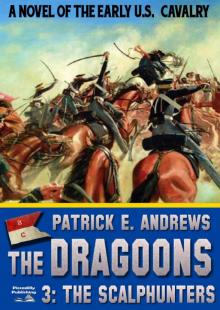 The Dragoons 3
The Dragoons 3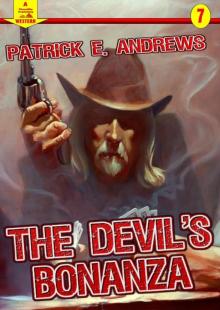 The Devil's Bonanza (A Piccadilly Publishing Western Book
The Devil's Bonanza (A Piccadilly Publishing Western Book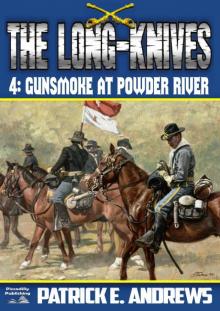 Gunsmoke at Powder River (The Long-Knives #4)
Gunsmoke at Powder River (The Long-Knives #4)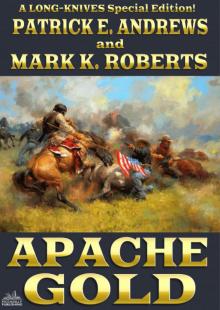 The Long-Knives 6
The Long-Knives 6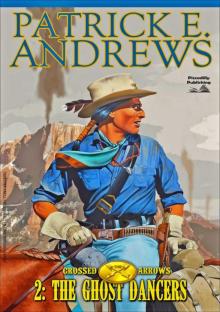 The Ghost Dancers (A Crossed Arrows Western Book 2)
The Ghost Dancers (A Crossed Arrows Western Book 2)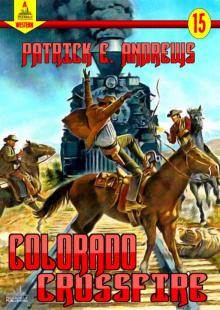 Colorado Crossfire (A Piccadilly Pulishing Western Book 15)
Colorado Crossfire (A Piccadilly Pulishing Western Book 15)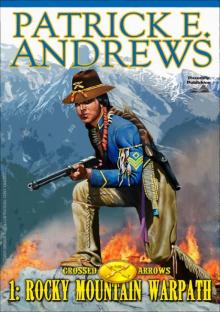 Rocky Mountain Warpath (A Crossed Arrows Western Book 1)
Rocky Mountain Warpath (A Crossed Arrows Western Book 1)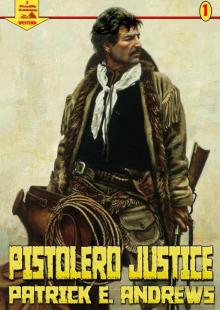 Pistolero Justice (A Piccadilly Publishing Western
Pistolero Justice (A Piccadilly Publishing Western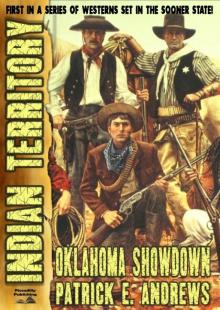 Oklahoma Showdown (An Indian Territory Western Book 1)
Oklahoma Showdown (An Indian Territory Western Book 1)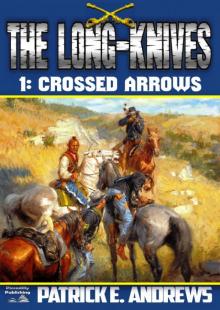 Crossed Arrows (A Long-Knives Western Book 1)
Crossed Arrows (A Long-Knives Western Book 1)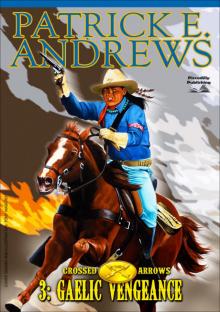 Crossed Arrows 3
Crossed Arrows 3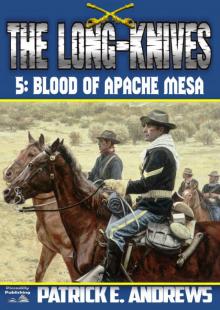 Blood of Apache Mesa
Blood of Apache Mesa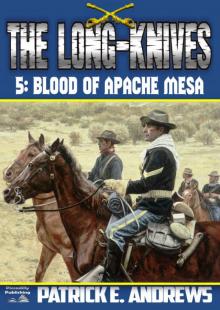 The Long-Knives 5
The Long-Knives 5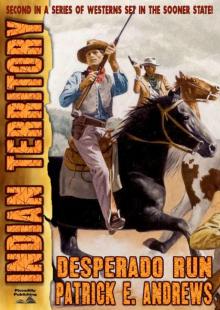 Desperado Run (An Indian Territory Western Book 2)
Desperado Run (An Indian Territory Western Book 2)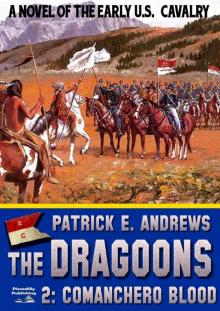 Comanchero Blood (A Dragoons Western Book 2)
Comanchero Blood (A Dragoons Western Book 2)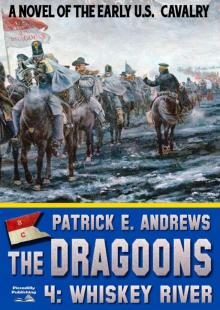 The Dragoons 4
The Dragoons 4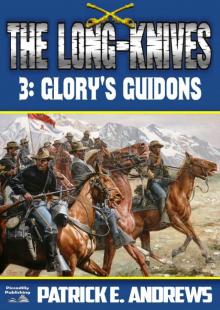 Glory's Guidons (The Long-Knives US Cavalry Western Book 3)
Glory's Guidons (The Long-Knives US Cavalry Western Book 3)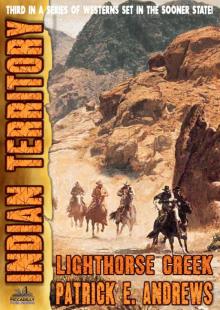 Indian Territory 3
Indian Territory 3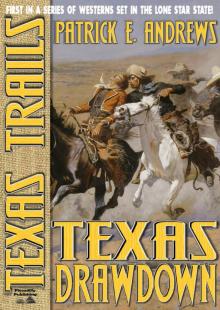 Texas Trails 1
Texas Trails 1